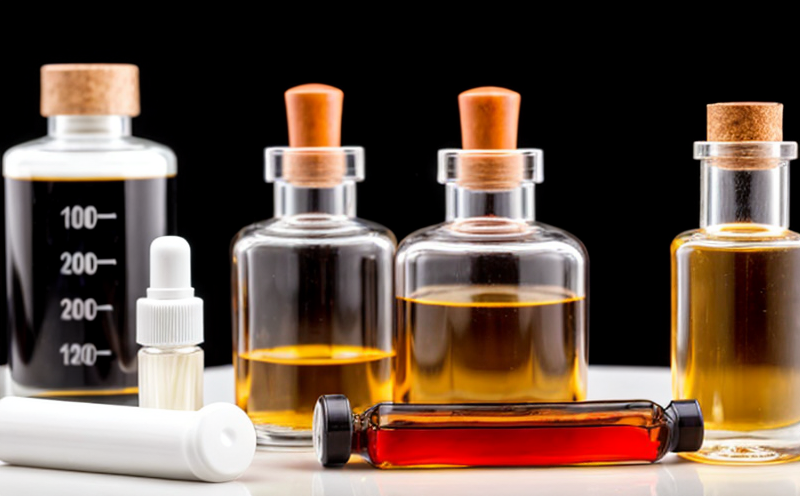Drug Interaction Chemical Testing
The pharmaceutical industry is built on a foundation of rigorous testing and quality assurance. One critical area within this sector is drug interaction chemical testing. This process involves analyzing how different drugs interact with each other, ensuring that the combination does not lead to adverse effects or reduce efficacy. Proper drug interaction testing is essential for developing safe and effective medications.
Drug interactions can occur at various stages of drug development: during preclinical trials, in clinical studies, and even after a product has been approved for market release. Understanding these interactions helps researchers design better formulations and dosages while ensuring that patients are not exposed to potentially harmful combinations.
The testing process typically involves several steps. Initially, the drugs involved in potential interaction need to be identified based on their pharmacokinetics and therapeutic profiles. Once identified, they undergo extensive analysis using high-performance liquid chromatography (HPLC), mass spectrometry, and other advanced analytical techniques. These methods help quantify drug concentrations accurately and detect even trace amounts of metabolites or intermediates that could indicate unwanted interactions.
A major challenge in this field is ensuring consistent results across different laboratories. To address this issue, international standards such as ISO 17025 provide guidelines for laboratory accreditation, which helps maintain uniformity in testing procedures worldwide. Compliance with these standards ensures reliability and reproducibility of test outcomes—a crucial factor when comparing data from multiple sources.
Another aspect worth mentioning is the role played by regulatory bodies like the U.S. Food and Drug Administration (FDA) or European Medicines Agency (EMA). These organizations set stringent requirements for drug interaction studies, specifying which parameters must be evaluated and under what conditions. Adherence to these regulations guarantees that any new medication meets strict safety standards before being made available to consumers.
In summary, accurate and reliable drug interaction chemical testing plays a vital role in safeguarding public health by preventing adverse reactions caused by improper combinations of therapeutic agents. By leveraging cutting-edge technology and adhering strictly to established protocols, laboratories like Eurolab can deliver precise results that contribute significantly towards safer pharmaceutical products.
Eurolab Advantages
At Eurolab, we pride ourselves on offering comprehensive drug interaction chemical testing services tailored specifically for the pharmaceutical industry. Our expertise lies in providing robust solutions that meet both current regulatory expectations and emerging trends within this rapidly evolving sector.
- Accurate Results: Utilizing state-of-the-art instrumentation and experienced scientific staff, Eurolab ensures precise measurements of drug interactions. This accuracy is particularly important given the complex nature of these tests.
- Comprehensive Approach: Our service encompasses all stages of drug development—from initial identification through final approval—ensuring thorough evaluation throughout each phase.
- Regulatory Compliance: By adhering strictly to international standards such as ISO 17025, Eurolab maintains high levels of reliability and consistency in our testing processes. This compliance also facilitates smoother interactions with regulatory bodies worldwide.
- Prompt Turnaround Times: With efficient workflows and streamlined operations, we aim to deliver timely reports without compromising on quality or depth of analysis.
These advantages reflect Eurolab's commitment to excellence in every aspect of our service offering. Whether you're an R&D engineer looking for precise data or a compliance officer ensuring adherence to strict regulations, Eurolab stands ready to support your needs with top-tier laboratory services.
Customer Impact and Satisfaction
- Better Product Development: By identifying potential drug interactions early in the development process, companies can make informed decisions about formulation changes or dosage adjustments. This not only enhances product safety but also improves overall efficacy.
- Enhanced Reputation: Demonstrating a commitment to quality and safety through rigorous testing strengthens brand reputation among stakeholders, including healthcare professionals and consumers.
- Compliance Assurance: Ensuring compliance with regulatory requirements helps avoid costly delays or rejections during the approval process. It also minimizes legal risks associated with non-compliance issues.
- Patient Safety: Above all else, accurate drug interaction testing contributes directly to patient safety by preventing adverse reactions that could result from improper combinations of medications.
The feedback we receive from satisfied customers further reinforces our belief in the value we bring. Many have noted improvements in their product development timelines due to early identification of issues, while others appreciate the peace of mind provided knowing their products meet stringent safety standards.
Use Cases and Application Examples
- New Drug Application (NDA): During the submission process for a new drug application, comprehensive interaction studies are required to demonstrate that the proposed medication does not pose risks when used concurrently with other commonly prescribed drugs.
- Post-Marketing Surveillance: After a product has been launched onto the market, ongoing monitoring is essential. This includes evaluating interactions between the original formulation and any new therapies introduced later.
- Pediatric Formulations: When developing medications specifically for children, understanding how these drugs interact with existing treatments used by pediatric patients becomes crucial. This knowledge can help tailor dosages appropriately to ensure both effectiveness and safety.
These examples illustrate just a few scenarios where drug interaction testing plays an indispensable role in ensuring safe and effective pharmaceutical products. By leveraging Eurolab's specialized expertise, clients benefit from enhanced confidence in their products' performance across diverse applications.





